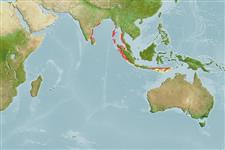Teleostei (teleosts) >
Blenniiformes (Blennies) >
Blenniidae (Combtooth blennies) > Salariinae
Etymology: Praealticus: Latin, prae = in front of + Latin, altus, alticus = nutritious.
Environment: milieu / climate zone / depth range / distribution range
Ecology
Marine; demersal; depth range 0 - 3 m (Ref. 90102). Tropical
Distribution
Countries | FAO areas | Ecosystems | Occurrences | Point map | Introductions | Faunafri
Eastern Indian Ocean: Andaman Islands.
Size / Weight / Age
Maturity: Lm ? range ? - ? cm
Max length : 7.0 cm TL male/unsexed; (Ref. 90102)
Short description
Identification keys | Morphology | Morphometrics
Dorsal spines (total): 13; Dorsal soft rays (total): 17 - 19; Anal spines: 2; Anal soft rays: 18 - 19. General coloration, brown, with 20-22 pale vertical lines on snout and upper lip, extending posteriorly to lower cheek, and approximately 8 sets of double bars on side. Dorsal fin deeply notched; segmented caudal rays 13-14, branched middle 1-7; pinnately branched supraorbital tentacle; lacking nape cirri; posterior rim of anterior nostril with small cirrus, typically branched; upper and lower lip margins crenulate; males with triangular occipital crest (smaller in females); last dorsal ray and caudal peduncle connected by membrane; elongate body, depth at anal-fin origin ca. 6.1 in SL. Maximum length 7 cm TL (Ref. 90102).
Facultative air-breathing (Ref. 126274); Adults inhabit reef flats in the intertidal zone and also found in rocky shores where tidal surges are strong (Ref. 90102). Oviparous. Eggs are demersal and adhesive (Ref. 205), and are attached to the substrate via a filamentous, adhesive pad or pedestal (Ref. 94114). Larvae are planktonic, often found in shallow, coastal waters (Ref. 94114).
Life cycle and mating behavior
Maturity | Reproduction | Spawning | Eggs | Fecundity | Larvae
Oviparous, distinct pairing (Ref. 205).
Springer, V.G., J.T. Williams and T.M. Orrell, 1991. Catalog of type specimens of recent fishes in the National Museum of Natural History, Smithsonian Institution, 2: Blenniidae. Smithson. Contrib. Zool. 519:28. (Ref. 10697)
IUCN Red List Status (Ref. 130435: Version 2024-2)
Threat to humans
Harmless
Human uses
Tools
Special reports
Download XML
Internet sources
Estimates based on models
Phylogenetic diversity index (Ref.
82804): PD
50 = 0.5001 [Uniqueness, from 0.5 = low to 2.0 = high].
Bayesian length-weight: a=0.00776 (0.00356 - 0.01695), b=3.00 (2.81 - 3.19), in cm total length, based on LWR estimates for this (Sub)family-body shape (Ref.
93245).
Trophic level (Ref.
69278): 2.0 ±0.00 se; based on food items.
Resilience (Ref.
120179): High, minimum population doubling time less than 15 months (Preliminary K or Fecundity.).
Fishing Vulnerability (Ref.
59153): Low vulnerability (10 of 100).
